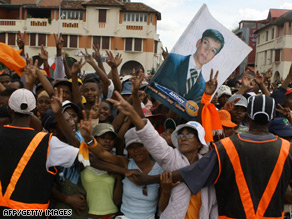By David McKenzie
(CNN) — What’s happening in Madagascar?

Supporters of opposition leader Andry Rajoelina attend a rally in Antananarivo on Monday.
Marc Ravalomanana resigned as Madagascar’s president after weeks of bitter and deadly political clashes.
The military handed power to Andry Rajoelina, the 34-year-old former mayor of Antananarivo. Rajoelina and Ravalomanana have been engaged in a bitter power struggle since the beginning of the year.
Despite vowing that he would never give up power without an election or referendum, Ravalomanana fled his presidential palace. The army later stormed the abandoned palace as a show of support for Rajoelina.
Analysts believe that Ravalomanana had little choice but to step down once he lost the army’s support.
The power grab ended a chaotic few days in the island nation. Though Rajoelina’s supporters say he is now in charge, the dust has not yet settled. Is this a Coup, as the African Union has suggested, or is this a popular expression of the people?
Why did this happen?
Trouble has been brewing in Madagascar since January, when Ravalomanana sacked Rajoelina from his post in the capital.
Rajoelina, a former DJ and media entrepreneur, tapped into rising frustration in the country over high food prices and service delivery to rally support against the president. He set up a parallel government and led massive street protests against his rival.
Over 100 people were killed in the protests, culminating in a demonstration outside the presidential palace in February when a further 23 were killed. Reports suggest most were killed by the security forces.
While Rajoelina has tapped into popular discontent, Madagascar watchers say that to call this a popular revolution over simplifies the takeover. “I think at first Ravalomanana was quite popular with the people but he treated the political elite with disdain,” said historian Stephen Ellis. This made him enemies within the country.
Ravalomanana v. Rajoelina — are they that different?
Ravalomanana made his fortune in business and has interests in several media outlets. He came to the fore politically in 1999 when he was appointed mayor of Antananarivo.
Rajoelina gained prominence as a DJ and also has interests in several media businesses. He too gained political traction by becoming the mayor of Antananarivo.
Both men gained popular support by reaching out to the masses as a leader for the youth of Madagascar.
Ravalomanana was first elected president in 2001 and won a second term in 2006. To many Malagasy he represented a new breed of politician-a self-made millionaire, a no-nonsense business leader. But Ravalomanana maintained his business empire while in office and it was unclear to many where his business interests ended and his political leadership began.
Rajoelina tapped into the very same strategies of slick marketing and a youthful appeal that Ravalomanana had depended on. Some feel he is just a younger version of the former president.
Will the international community recognize the new government?
It is unlikely that key members of the international community will rush to support Rajoelina’s push into power.
“All of the parties to this conflict need to exercise restraint and resume dialogue,” said Robert Wood, U.S. State Dept. Spokesman, “I also want to make clear that any extra constitutional resolution will result in a cut-off of U.S. assistance.”
Prior to the takeover, the African Union warned that any power transfer aided by the military would amount to a coup d’ état. The AU has since diluted its rhetoric-removing any mention of a coup in its official communiqué on the takeover and calling for the protagonists to “comply scrupulously with the provisions of the Constitution of Madagascar on interim arrangements.”
The crisis in Madagascar is a test for the African Union. Despite purporting to be champion of democracy, recent power grabs in Mauritania and Guinea and the botched elections in Kenya and Zimbabwe, have tested the continental groups claims.
Why should you care about Madagascar?
Madagascar isn’t just a cartoon movie. It is the fourth largest island on the planet with a population of around 20 million, a rich cultural history and breathtaking natural diversity.
In the relative stability of the last 8 years, the country’s tourism sector has boomed, bringing in hundreds of millions of dollars. However most ordinary Malagasy have not seen any trickle down from the tourism industry. The country remains one of the poorest in the world.
 Uniting Missions in Africa
Uniting Missions in Africa
No user commented in " Madagascar power struggle explained (cnn.com) "
Follow-up comment rss or Leave a